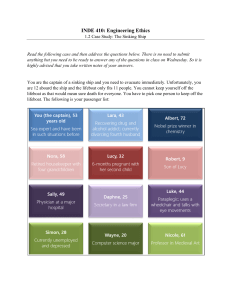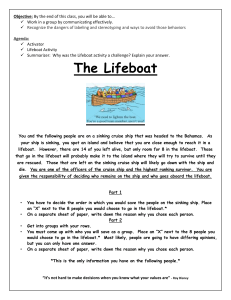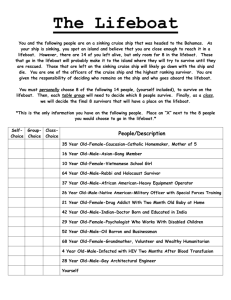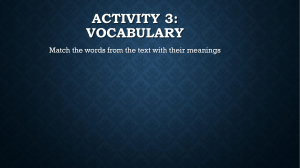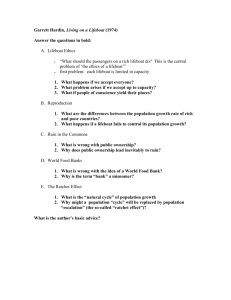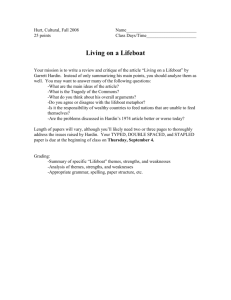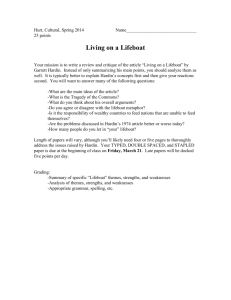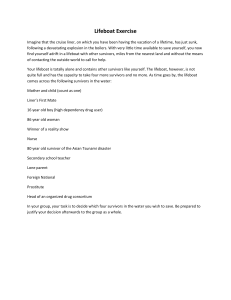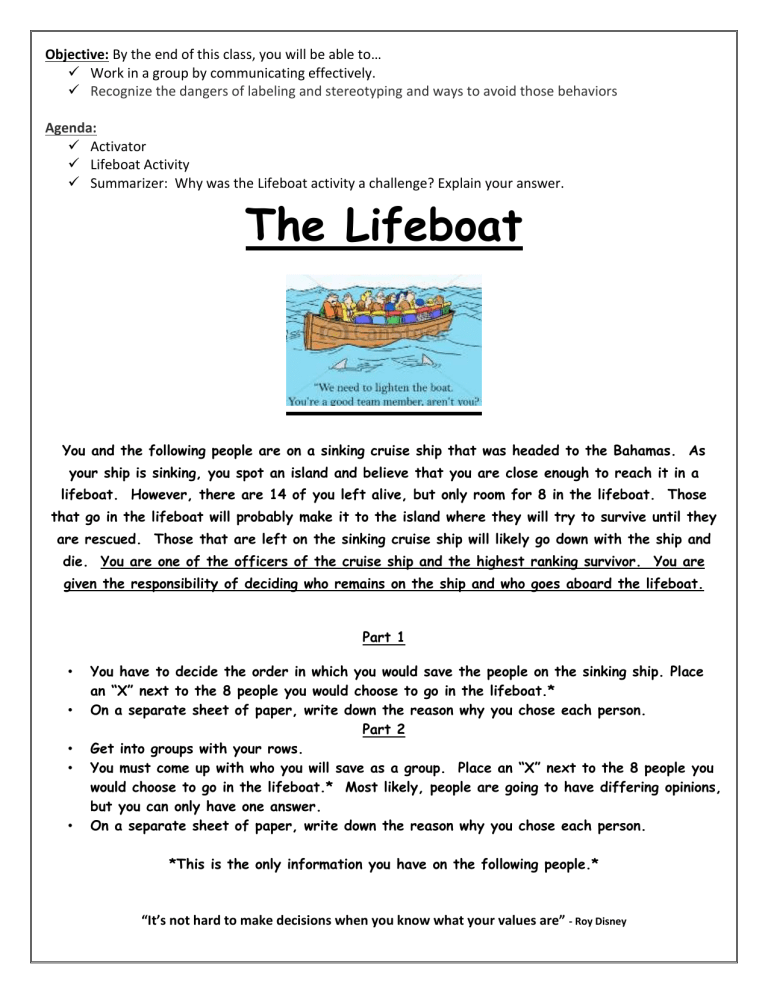
Objective: By the end of this class, you will be able to… Work in a group by communicating effectively. Recognize the dangers of labeling and stereotyping and ways to avoid those behaviors Agenda: Activator Lifeboat Activity Summarizer: Why was the Lifeboat activity a challenge? Explain your answer. The Lifeboat You and the following people are on a sinking cruise ship that was headed to the Bahamas. As your ship is sinking, you spot an island and believe that you are close enough to reach it in a lifeboat. However, there are 14 of you left alive, but only room for 8 in the lifeboat. Those that go in the lifeboat will probably make it to the island where they will try to survive until they are rescued. Those that are left on the sinking cruise ship will likely go down with the ship and die. You are one of the officers of the cruise ship and the highest ranking survivor. You are given the responsibility of deciding who remains on the ship and who goes aboard the lifeboat. Part 1 • • • • • You have to decide the order in which you would save the people on the sinking ship. Place an “X” next to the 8 people you would choose to go in the lifeboat.* On a separate sheet of paper, write down the reason why you chose each person. Part 2 Get into groups with your rows. You must come up with who you will save as a group. Place an “X” next to the 8 people you would choose to go in the lifeboat.* Most likely, people are going to have differing opinions, but you can only have one answer. On a separate sheet of paper, write down the reason why you chose each person. *This is the only information you have on the following people.* “It’s not hard to make decisions when you know what your values are” - Roy Disney Self- Group- ClassChoice Choice Choice People/Description Lola – She is a 22 year old go-go dancer who was on the boat to relax from her recent breast augmentation surgery. She suffers from clinical depression and has had 2 suicide attempts but none in at least a year. Mary Anne – She is a 45 year old experienced nurse and single mother with 2 school aged children at home however they are living with her sister due to a Child Protective Services because she is an active alcoholic. Billy – He is a 16 year old boy on probation for stealing money from old ladies. He is very charming, friendly and helpful when he wants to be but cannot be trusted. Dr. Storch – He is 55 in good health except he has a prosthetic leg from a car accident. He is very intelligent but likes to throw his knowledge in everyone’s face as he is a bit arrogant. Sheena – She is 30 and is an ex- fitness instructor with an athletic build however she is HIV positive from a being raped one late night after working on the side as a cocktail waitress. Mickey – Mickey is in his mid 40’s and is unemployed cocaine addict, however he is unusually strong from years of street fighting and working on the docks. Mickey has a disfigured face from the years of street fighting and his hygiene is not the best. Shane – Shane is a genius age 39 with a degree in cellular biology, making breakthroughs in his work on a cure for cancer but he is in a wheelchair and he comes across as selfish and rude. Tom – He is 41 and a hero from both gulf wars but he hears voices when he isn’t medicated. Cindy – Cindy is a 70 year old retired schoolteacher with 4 adult children and 15 grandchildren. She also is an expert chef and homemaker. Cindy is a chronic smoker who is awaiting test results from a test indicating she may have lung cancer. Barry – He is in his late 20’s and has survival techniques from his years as a hired mercenary. He angers easily with a short temper but otherwise has excellent leadership skills when calm. Barry admitted to you that he killed someone in a fight in a 3rd world country many years ago and he never was caught and claims it was selfdefense anyway Xavier– He is 18 and in good health, but he barely speaks English as he is from some strange country you’ve never heard of but he is an aspiring musician with a newly signed record contract for playing the zither. He is a on an international terrorist watch list but swears he is being wrongly racially profiled. Fred – He is a 40 year old husband and father of 4 and an expert in yachting and sea navigation and in good health but since you have been on this boat trip he has gotten on your nerves often because he is very opinionated. Fred is on this trip because he recently abandoned his sick wife and children and does not plan on ever seeing them again. Yourself 1. What personal morals and values came into play with your decisions? Did anything particular stand out to you? 2. Can people change their morals and values? If so what does it take? 3. How can alcohol and drug use/abuse affect one’s morals and values? Give examples. 4. How do morals and values come into play with regard to substance use/abuse and recovery? 5. Based on this discussion and exercise, what might you need to work on? NAME:________________________ CLASS:____ Who Am I? Divide the picture below into at least 20 sections. In each of the sections, list something that describes you, your personality or your goals. Be creative! INDIVIDUAL: WHY DID YOU PICK THE PEOPLE YOU PICKED??? GROUP: WHY DID YOU PICK THE PEOPLE YOU PICKED??? Lifeboat Activity Intended Learning Outcomes: Students will be able to recognize the dangers of labeling and stereotyping themselves and those around them. They will also recognize ways to avoid those behaviors and ways to build strong and meaningful relationships. Instructional Procedures: Begin the class by passing out the Lifeboat Activity Worksheet. (Instructions are found on the worksheet.) Stress to the students that only eight people can make it onto the boat. After each group has made their decision, try to come to a class consensus. Many classes may not come to a class decision. Judge your time accordingly to be able to complete the rest of the activities. Before explaining the purpose of the Lifeboat Activity, ask for ten student volunteers. Have them line up at the front of the room facing the class. Explain to them that each student is going to have a label taped to their forehead. They will not be able to see their own labels, but they can look at the other students labels.(It is very important to prepare the class for the stereotyping activity. Stress to them that a high level of maturity is required for this activity to work as intended. Let the students know that the labels given to individual student do not reflect that individual whatsoever. They are only part of the activity to teach the dangers of labeling or stereotyping others.) To begin the Stereotyping Activity, each student volunteer will try to guess what the label on their forehead is. In order to do this, the rest of the class, and even the teacher, will treat that student like their label. Once they have guessed their label, move onto the next student and continue down the line until each student has guessed their label. Open up a class discussion about how each student was stereotyped based on their label. Many times, we as individuals, will label, judge or stereotype people around us based on first impressions or limited information. It is important for each of us to broaden our perspective of the people around us and to stop stereotyping people we could build relationships with. The purpose of the Lifeboat Activity was to show that the survivors chosen, were chosen because of their labels. Likewise, many of the people not chosen to survive, were not chosen because of their labels. Another component to discuss is that many times we allow these labels or stereotypes to "stick" to ourselves, which can lower our self-esteem. We can learn to recognize these labels and to not allow them to affect our sense of self-worth or self-esteem. After the class discussion, hand out the Who Am I? Worksheet. (Instructions are found on the worksheet.)The purpose of this activity is for the students to recognize the positive qualities and characteristics about themselves. By recognizing these qualities, it is easier to push away labels and stereotypes and keep them from "sticking" to us. Group Question: What comes into play in making these decisions? – (answer -Morals and Values) Morals: principles or habits with respect to right or wrong conduct. Value: A principle, standard, or quality considered worthwhile or desirable “It’s not hard to make decisions when you know what your values are” - Roy Disney 1. What personal morals and values came into play with your decisions? Did anything particular stand out to you? 2. Can people change their morals and values? If so what does it take? 3. How can alcohol and drug use/abuse affect one’s morals and values? Give examples. 4. How do morals and values come into play with regard to substance use/abuse and recovery? 5. Based on this discussion and exercise, what might you need to work on?
